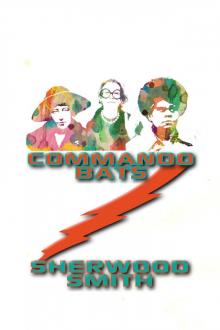- Home
- Sherwood Smith
The Thrones of Kronos Page 11
The Thrones of Kronos Read online
Page 11
o0o
Inside Lysanter’s lab, Tat Ombric glanced at the chrono again, trying to ignore her insides trying to squish into a ball. She eyed the bracing on the towering compute arrays near her station: it was just about time for the new tempath to make her try in the Chamber of Kronos.
She saved her work and looked up. Barrodagh’s two goons were nowhere to be seen. Tat grimaced in disgust, imagining Fasarghan and Nyzherian crammed into the armored disposer chamber they’d procured, ostensibly on behalf of Lysanter, who never used it. Only way anybody would want to get close to Nyzherian. He was avoiding the showers as well as the disposers as much as possible.
She could see and hear her fellow Bori saving their work; a discriminator in her node reported the same. Tat braced herself. The silence pressed in on her; how she hated waiting. Even the whisper of the conditioners ceased. It seemed no one in the data center was breathing at all.
A Bori near the door made a hand sign: She comes.
o0o
To Vi’ya’s surprise, Barrodagh halted the conveyance at the nexus before the Chamber of Kronos. They walked down the long, twisting tunnel in which Morrighon had initiated their startling conversation. Vi’ya sensed the waiting, watching, fearful Bori techs, though no one spoke.
Perhaps complex mechanics were unsafe during a tempathic probe: she’d seen a vid of the TK manifestation during the first tempath’s attempt. That was the only one she’d watched. Lysanter had been fascinated by Vi’ya’s explanation that watching a vid of a tempath was, for her, the same as him watching a vid without the sound. He’d ducked his head as he scribbled notes; he appeared free of the discomfort most people manifested around a tempath.
Another surprise awaited her in the chamber itself. Neither Anaris nor Morrighon were there.
“Captain Vi’ya, right on time!”
“You must thank Barrodagh for that,” she replied. She couldn’t help liking Lysanter, for he was one of the few people she’d met on the Suneater whose proximity was not unpleasant. But he, too, might soon be an enemy, so politeness was all he would get.
How very Douloi. The thought nearly made her laugh.
“Go ahead, then,” the scientist said, waving his hand at the clear dyplast shield that blocked direct access to the Throne of Kronos. “Approach it however you wish. If the previous attempts are any indication, you will know you’re on the right course before we do.”
Vi’ya braced against a surge of hateful anticipation from Barrodagh, with the subtle undercurrent that indicated the memory of a vid image. Was he remembering a vid of Norio’s death? Just as well she hadn’t seen it. Perhaps Barrodagh was also the one who had sequestered Norio’s chips. She wondered if he had any idea how much money a recording of Norio’s death would sell for; the tempath had made many enemies. Almost as many as Hreem.
She dismissed these thoughts as she rounded the shield and walked slowly toward the high, stalagmitic mound that held the Heart of Kronos. This would be the first time she’d seen the little silver sphere since she lost it to Giffus Snurkel on Rifthaven, and she’d learned much with the Eya’a in the months since. Perhaps that was why her emotions seemed so fluid, why music and images flickered at the perimeter of her awareness.
Vi’ya stopped at the edge of the Throne. She cocked her head, listening. Voices? No, nor memories, nor the perception of emotions, nor thoughts. There were no words, not even concepts, only dark and light, approaching and receding, up and down, rough-smooth, red-green . . .
The world dissolved into a synesthetic pastiche. She reached out for the Eya’a—and found nothing. Then a tripled blue flicker laved her consciousness, carrying a sense of confidence. The chamber resolved once more into red-glowing walls and smooth organic lines.
She stepped over the subtle demarcation and set her foot down. The unmistakable signature of the Heart of Kronos seared her mind, stronger than she had ever felt it before its loss, smashing her back into limbic fragmentation.
But faster still was the blue radiance of the Kelly, which surrounded her, providing a boundary of safety. Gradually the blue coalesced into a bubble, drawing her inward again until her surroundings reassembled and she slipped back into her body as if pulling on a suit. Sight, sound, smell. Touch. Breathing. Her body swaying: she straightened upright, and took another step.
And another, until she was ascending the steepening surface of the Throne. Despite its smooth appearance, its material seemed to grip the soles of her boots. She found it impossible to think of it as a machine: nothing she sensed corresponded with any machinery she knew.
Abruptly she stood at the top; her memory felt like a badly edited vid. Or had she teleported? Vi’ya shook her head, struggling to hold control of the here and the now.
She looked down at the Heart of Kronos, mounted in the center of a low, curved verge that suggested the back of a chair. Her face looked back at her in spherical distortion, sparking laughter. Her reflection looked like she felt, her head distended by the weighty aura the station seeping into it.
Slowly, feeling almost like she was moving underwater, Vi’ya brought her hands down and gently touched the Heart.
Time stopped.
For a moment longer than her entire life, her awareness swelled, flashing out along hidden conduits to encompass the entire station and the manifold emotions of its inhabitants in a dizzying, directionless mélange: the dark, prideful control of the Lords, the bright glows of her crew, the strange complexity of the Kelly, and above it all, the pervasive fear that was the engine of Dol’jhar’s ambitions.
And malevolence. Startled, she jerked her awareness away from a bubble of darkness that gave the impression of concealed eyes, as something within the Heart of Kronos seemed to stir. It began to unfold in a fashion that plucked at her mind with limitless power, something she was not ready to confront or even to understand.
For Tat, who could not see into the Chamber, her first sign was a faint shudder from the air around them, which rapidly intensified.
That was the worst of it, she thought, gripping the edge of her console and closing her eyes. It started just like the earthquakes she remembered when she was very small. That first moment, you didn’t know if it would be small or grow with that horrible accelerating intensity, causing things to jiggle and then crash. But this motion was different, like a gigantic beast twitching its muscles to dislodge irritating mites.
Was the station groaning? No! It’s just the stresses in the station’s material!
But holding onto rationality didn’t lessen her fear one bit. The shaking seemed to go on forever; an array brace split with a shocking crack as the ceiling flexed, chips and papers spilled, and someone screamed in terror as a pucker no one had ever seen before appeared in a wall and opened with a loud scroinch.
With the last vestige of volition, Vi’ya pulled her hands away. She swayed, aware of the fathomless depths not far in front of her, and then, recognizing safety in the quiet darkness that was rising up around her, she turned around and let herself slide to a seated position against the back of the Throne, and fell gratefully into unconsciousness.
For Tat and the techs, the motion stopped. No one moved or spoke.
Tat turned her head a tiny bit, as if her own movement might set it off again, and met the terrified gaze of the Bori tech at the next pod. His eyes were black dots surrounded like white. She was sure she looked just the same.
“To work, Tatriman.” A dry alto voice spoke from the end of a row of compute arrays: Barrodagh’s head goon. The tension in Fasarghan’s body made a lie of her confident posture.
Tat turned around again, her lips compressed. She loathed the Dol’jharian custom of addressing Bori by full name, with no family appellation; it felt like a rebuke to unruly children.
But she said nothing as she bent to gather up the data chips that had scattered across the console. She took comfort in the simple task as she waited for her heart to slow. The chip labels glinted in the true-spectrum lighting of the la
b, which, along with its abundant stasis clamps, made it feel like one of the safest places on the station.
Allouette’s Stress Algorithm for N-Dimensional Integer Fields.
It was like being back on the Samedi, whose aged computer had never been properly flushed out. You had to use read-only chips for critical programs, or they’d get eaten by the vermin code that four hundred years of operation had accumulated.
Handbook of Morphological Constants.
Here on the Suneater, it wasn’t age, but the constant data warfare of the Catennach—and those of lower castes with the knowledge—that made the station’s arrays so dirty. She wondered why Lysanter, himself an accomplished noderunner, tolerated it.
Ogelson’s Hypersieve.
Tat breathed deeply as a sense of order gradually reassembled in her mind, and with it, hope. She was in tight with the Urian specialist, although she didn’t trust him for a moment. He’ll do anything for his synthesis. But he gave her whatever algorithms she asked for, and accepted her explanations without demur. She’d told Nyzherian she was using this one to map some patterns she’d seen in the quantum interfaces. She’d even built some functional structures with it. But it was in laboriously scavenged hidden space that she used the Hypersieve far more effectively in its true purpose: cryptography.
Mind orderly, she bent to the task of ordering her workspace, then turned back to her console, to discover that the pattern discriminators she’d set up indicated a strange sort of double pattern during the tempath’s attempt. One died away entirely. The other seemed to persist, although awfully close to the noise level. As she tried to tease the data out, a neuraimai clamored for attention, announcing a correlation with past data: the persistent trace seemed to be a transform of patterns seen in all past attempts, in a complex harmonic pattern based on primes.
Tat almost laughed. Her temkin code using Ogelson’s adaptive algorithm had actually yielded results. But what did it mean? Regret suffused her. She’d have to delay her crypto; Lysanter would demand more analysis, and she’d better get it out of the way now. She dove back into work, mind so focused she was surprised when the shift ended and the next crew came in to take over.
As Tat rose to make way for her replacement, he glanced furtively to either side, without turning his head. Her gaze dropped to his hands, which semaphored rapidly.
Tunnels-change—new-tunnels.
Then he pushed by her and seated himself in the pod without once looking up, and Tat knew they were being watched.
She finished stacking her backup work, then departed.
Out in the corridors, she glanced at faces, and when she saw a friend, she signaled: Tempath?
Alive.
Tat was glad. She didn’t know those Rifters—they might well be as nasty a bunch of scum-suckers as her former crewmates aboard the Samedi—but they were Rifters. She wanted them to win.
So far Lar said they weren’t scum, which made his sudden reassignment to them feel like good fortune. Something she’d thought impossible here. Tat knew they owed that to Morrighon, although as yet she didn’t know why.
Nor would she let it worry her, for now. Morrighon wasn’t leaving the station before she was, and her main goal was to get away. As soon as possible.
Back in the tiny room she shared with her cousins, she unlatched her belt pouch and totaled her work counters. If she was careful, she would be fine until the next issue day.
Not that she went to gamble, or as the Dol’jharians more primly put it, “compete in table games”—she went to hear gossip. But it wouldn’t do to go without something to spend.
With a return of her earlier fear, she scanned the tunnels on the way to the rec room. They appeared unchanged. Or were the lights dimmer?
Oh, how she longed for real light—even the refracted starlight from space—instead of this false yellow glare that was never dimmed, someone’s attempt to overcome the psychological effect of the red-glowing walls.
It doesn’t work. But it would be suicide to complain. Even full-spectrum wasn’t good enough, and she couldn’t spend all her time in the lab, anyway. Even if she wanted to, which she didn’t. The scrutiny of Barrodagh’s minions was too strong there.
The rec room was intact. Two stasis clamps held the door open; the scaffolding around it looked like someone’s mouth held open with steel clamps. She winced and dashed through.
Inside, things looked normal. At one side Bori were busy at consoles and tables, their voices higher and lighter than those of the Dol’jharian ordinaries who congregated on the side of the room with the most clamps.
Tat scanned the back, where a segment of wall puckered and released in a slow rhythm, as if something beneath it was breathing. Those lowest in status were forced to stay there, and sure enough, she saw Dem squatting too near that wall, rocking back and forth in a gentle rhythm as he smiled at nothing.
She rushed straight to him, then careful not to startle him, touched his hand.
He opened his eyes and turned his face up. “Tat,” he said happily. Dem was always happy—as long as the authorities ignored him.
She bent down to kiss him, drawing him firmly away from the undulating wall. Nobody would look out for him. She knew the Dol’jharians would find it entertaining if he were sucked in.
She sighed, and coaxed him to one of the games, where he was soon lost in watching the images. She played both sides as she listened to the talk around her; nobody cared enough to notice that he didn’t play.
An hour or so later, Lar’s fingers slid under her hair and caressed her neck. She looked up. His thin, expressive brows twitched upward. Her heartbeat quickened when she recognized in Lar’s huge pupils and his compressed mouth that he could barely contain his excitement.
“Tatriman!” someone called.
Tat whirled, and relaxed when she recognized Lenorragh, one of her coworkers at the data center. Behind her walked a handsome Bori she’d seen infrequently—and had carried hand warnings from. His face was heart-shaped, not round like most Bori, marked by beautifully articulated bones, framed by blue-black hair, as glossy as it was curly.
“This is Romarnan.” Lenorragh indicated her friend. “He’s with the life-support crew.”
Lar said, “Bad one today?”
Romarnan sighed. “Could have been worse. We only had a few breakdowns—or it would have been doubles for us again.”
They all sneaked quick peeks to see if they had been overheard. Work counters could be taken away from anyone who complained about double shifts. With some of the goons, mere mention of extra work was considered complaining.
But the low buzz of conversation around them did not break or diminish, so they settled at a table near the game console, where Dem still happily watched, the colors reflecting on his face.
“New set of tunnels,” Romarnan said in a low voice as Tat cut the cards. “Mapping expedition next shift, and then we have to light ’em.”
“That’ll make it even worse for Delmantias.” Lenorragh wrinkled her nose in a quick grimace. “Everyone wants stasis clamps, but Lysanter’s got the cims for more analysis and quantum interfaces.”
Sudden movement a couple tables away caused them to shift the subject to the card game. A new player settled at the next table. Tat recognized him from Barrodagh’s office when she had to go in and rewire his console. She made the signal for goons, and they spent the rest of the game talking about their cards. Tat was careful not to win or lose too much.
She trusted Lenorragh, and her instinct was to like Lenorragh’s friend, who seemed to talk before he thought, which would explain his low status on a work crew. She worked hard not to remind the other Bori that she had been a Rifter for most of her life. Made it easier for everyone.
There was only one bad moment, when one of the Lords’ runners appeared, but someone unknown to either Tat or Lar was the unlucky soul beckoned out, and conversation and movement promptly resumed.
Back in their room, Tat and Lar went first. It looked
safe enough; the dimensions had changed, but the bed had not been swallowed, nor the messy tumble of storage lockers.
They entered the disposer with Dem and watched over him, ready to yank him at the first sign of any sucking. He didn’t know he was being guarded, which was all right. When he stepped into the shower, Tat took her turn. Her bladder was burning. It was a relief to let go at last.
Lar held her hand, tightening his grip when they both felt the floor ripple gently. When she was done, Lar had his turn, and as Dem had wandered off to bed by then, they showered together.
Since Tat hadn’t had time to do her daily sweep for narks, Lar said under the hiss of water, “Dem found real treasure.”
“What?” Tat exclaimed. Was this the cause of the excitement she’d seen earlier?
“Ur-fruit. New kind—hallucinogenic. Dem finds ’em by smell. Manrimac, who leads his work detail, has ’em stashed. We get a cut of sales.”
The timer shut off the water, so that was the end of the conversation. She dried hastily, too tired to check for narks. So they climbed into bed, and were soon warm, their limbs tangled up with Dem’s. He was already asleep.
Lar’s fingers stroked absently at her belly, which made her—tired as she was—tingle all over. “New duty,” Lai whispered into her ear. “Have to take the Rifters’ food to them myself.”
“Why? What’s going on?”
“Montrose—that’s the chef—wanted some of their food from their ship. Someone said no, of course. Now they get limited choice from the Lords’ kitchen, but I take it direct.”
“Why, so no one else gets a chance at it?” Tat sighed in disgust. “Sounds like more of Barrodagh’s twistiness.” To force the workers to eat the same food every day was a stupid piece of cruelty, and needless. If the Dol’jharians really didn’t know how to install kitchens, they could strip one off a ship they’d captured, she thought indignantly. Even the poorest Rifter vessel had kitchens and monneplats with small bins of frozen meals waiting so you could order at least a few choices. The big ships had huge frozen storage lockers, not to mention better synthesizers and hydroponics —and so could something the size of this station. Of course, they had that for the Lords.

 Inda
Inda Danse De La Folie
Danse De La Folie King's Shield
King's Shield Whispered Magics
Whispered Magics Fleeing Peace
Fleeing Peace Barefoot Pirate
Barefoot Pirate Crown Duel
Crown Duel Mearsies Heili Bounces Back
Mearsies Heili Bounces Back Commando Bats
Commando Bats A Stranger to Command
A Stranger to Command Lhind the Spy
Lhind the Spy The Spy Princess
The Spy Princess Blood Spirits
Blood Spirits Sasharia en Garde
Sasharia en Garde Lhind the Thief
Lhind the Thief Paradise Drift
Paradise Drift Banner of the Damned
Banner of the Damned The Trouble With Kings
The Trouble With Kings Poor World
Poor World Treason's Shore
Treason's Shore Wren Journeymage
Wren Journeymage A Posse of Princesses
A Posse of Princesses Revenant Eve
Revenant Eve Once a Princess
Once a Princess Time of Daughters I
Time of Daughters I Rondo Allegro
Rondo Allegro Coronets and Steel
Coronets and Steel Over the Sea
Over the Sea Senrid
Senrid Hunt Across Worlds
Hunt Across Worlds A Sword Named Truth
A Sword Named Truth The Fox
The Fox Twice a Prince
Twice a Prince Fair Winds and Homeward Sail: Sophy Croft's Story
Fair Winds and Homeward Sail: Sophy Croft's Story Time of Daughters II
Time of Daughters II The Rifter's Covenant
The Rifter's Covenant The Phoenix in Flight
The Phoenix in Flight Stranger
Stranger The Thrones of Kronos
The Thrones of Kronos A Prison Unsought
A Prison Unsought Twice a Prince: Sasharia En Garde Book 2
Twice a Prince: Sasharia En Garde Book 2